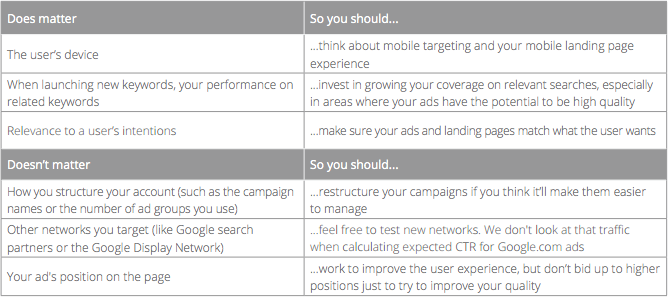In an effort to provide clarity regarding the components and significance of quality score, Google Chief Economist, Hal Varian released a white paper, Settling the (Quality) Score (PDF), in tandem with a video explaining the AdWords auction parsing process.
While there’s a treasure trove of information in both resources, Google seems primarily interested in driving home the point that quality score should be used to illuminate in-account issues, not be used as the guiding lantern in your trudge through the dank caverns of account management…so to speak.
Here are a few quotes pulled from the whitepaper that illustrate this:
- “Quality Score is like a warning light in a car’s engine that shows how healthy your ads and keywords are. It’s not meant to be [a] detailed metric that should be the focus of account management.” (pg. 3)
- “We’re continually improving the way that we calculate the quality of your ads, and that calculation will never be captured by a simple 1-10 number.” (pg. 6)
- “Your Quality Score will give you insight into how you’re performing, but ‘chasing the number’ shouldn’t be the focus of your optimizations.” (pg. 10)
Google also presented 3 items that do matter in improving quality, 3 items that do not, as well as actionable recommendations for all 6 scenarios. The below chart can also be found on page 3 of Settling the (Quality) Score.
Google also further emphasizes that Quality Score is more than just an integer, and that the score itself is not utilized during the ad auction. Rather, the three components of quality score— ad relevance, expected CTR, and landing page experience— are individually judged, weighted, and applied to the ad auction formula.
All in all, Google didn’t release any information that wasn’t already available to us, but it’s pretty evident that misguided optimizations and an industry-wide debate about the importance of quality score were prevalent enough to warrant a friendly reminder to not let the tail wag the dog.
So what have we learned, fellow paid-search clickmonkeys? Be creative, be compelling, be relevant, and always remember that actual performance indicating metrics should outshine all else when considering optimizations.
(featured image by Oaktor Photography/Flickr)




